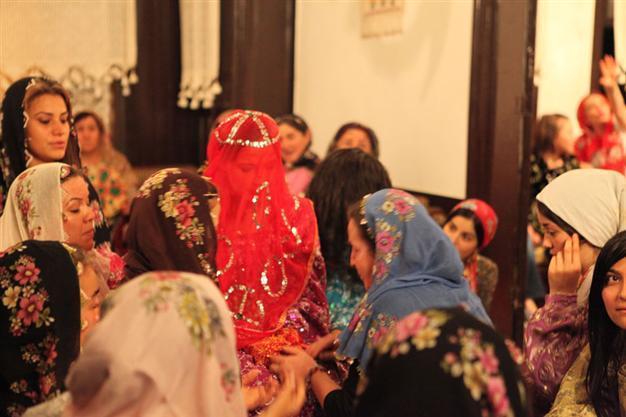‘Meryem’: Loss of innocence and child brides
Emrah Güler

Writer and director Atalay Taşdiken’s newly released feature ‘Meryem’ is based in idyllic Anatolian town and questions marriages.
“Innocence belongs to those who wait.” The tag line and theme of Atalay Taşdiken’s sophomore feature “Meryem” could very well have been the same one for his award-winning debut “Mommo” (The Bogeyman) of 2009. In “Mommo,” nine-year-old Ali and his little sister Ayşe, in a broken home, waited desperately for their aunt.
In “Meryem,” the newly-wed young woman of the title waits desperately for her husband to come home, or rather come to her in-laws’ home, where she has taken temporary residence. The fresh-faced Meryem (Zeynep Çamcı, in her first major screen role) was wed to Mustafa (Mehmet Usta) in rather a hurry, a favor to free her of the burden of finding a suitor herself. It’s a favor because Meryem’s father is dead, and her father-in-law is an old friend of her father’s.
The hurried nature of the wedding becomes evident when Mustafa comes from Istanbul to the small town where Meryem and his family live a few days before, and takes a few days off following the wedding. Meryem moves in with her in-laws (veteran actors Mustafa Uzunyılmaz and Zerrin Sümer), and makes it her duty to become the perfect housemaid for her new family. She becomes the dutiful housewife sans the husband, who is himself supposed to be making arrangements to set up their house in Istanbul, before coming to take his bride.
So begins the waiting, as Meryem piles pebbles into a jar for each day her new husband is away from her. Barely out of her teens, she has no idea what marriage is like, or what it’s supposed to be like. What’s even sadder is that she’s only seen the man she so desperately wants to spend the rest of her life with for a mere week. As her complaints grow more intense, her mother’s answer is the same: Be patient.
A complicated relationshipThings are further complicated when Murat (child-star-cum-mature-actor İsmail Hacıoğlu) returns from the army. Murat had fallen for Meryem, but was not quick enough to ask for her hand before being shipped off to the military. He comes back with his love for Meryem stronger, and his psyche bruised from his experience in the army. An impulsive and broken man becomes the ultimate threat for this newly-married young woman.
Meryem is torn between a nearly animalistic display of love, and the idea of a marriage she has consumed in her imagination. As the town begins stirring with the makings of a scandal, her in-laws find the ideal solution to ship their daughter-in-law to Istanbul, near her husband. They sell their only income, their cows, to put an end to the endless gossip of small-town life. As Meryem heads off to a new life, and closes an old one, the film takes an unexpected turn and the audience is left with a surprise ending.
Reality and dreams blend in Taşdiken’s feature, water and pebbles becoming a recurring motif in her dreams. The splendid cinematography by Feza Çaldıran at once takes the audience from the town next to a beautiful lake to the ethereal otherworld of Meryem’s dreams. Meryem, referring to the Virgin Mary, is a common girls’ name in rural Anatolia. With the water defying gravity in Meryem’s dreams and the innuendo to her virginity, the biblical references are there for the keener eye.
Child brides have always been on the more tragic side of Anatolian traditions for centuries, and are thus a favorite subject in Turkish cinema. One recent example was last year’s Crystal Bear-winner at the Berlinale, Reis Çelik’s “Lal Gece” (Night of Silence). The movie put an older man and an adolescent girl in the bridal chamber throughout most of its duration, to haunting effect. In “Lal Gece,” the suffocating nature of arranged marriages was told through a claustrophobic bridal chamber, and a war of words between two people. In “Meryem,” the suffocation is as palpable, albeit in an idyllic setting, in a beautiful town next to a lake. Here, it is not the privacy of the bedroom, but rather the people of smalltown life, that makes the reality of arranged marriages and child brides all the more harrowing.
